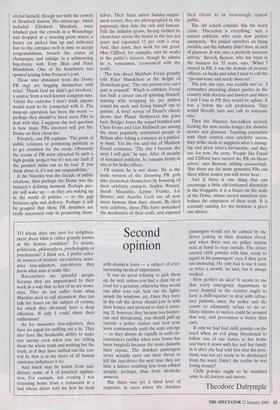Second opinion
TO whom does one turn for enlighten- ment about what is rather grandly known as the human condition? To priests, politicians, philosophers, psychologists or psychiatrists? I think not. I prefer eclec- tic sources of wisdom: rat-catchers, insur- ance loss-adjusters, taxi-drivers: they know what man is really like.
Rat-catchers are splendid people because they are impassioned by their work in a way that so few of us are nowa- days. They do not suffer from what Marxists used to call alienation: they can talk for hours on the subject of vermin, for which they obviously have a deep affection. If only I could share their enthusiasm!
As for insurance loss-adjusters, they have no equal for sniffing out a lie. They also have the invaluable ability to make you uneasy even when you are telling them the whole truth and nothing but the truth, as if they have sniffed out the cen- tral lie that is at the heart of all human existence (whatever it is). And much may be learnt from taxi- drivers, some of it of practical applica- tion. For example, last evening I was returning home from a restaurant in a taxi whose driver told me how he dealt with drunken louts — a subject of ever- increasing medical importance.
It was no good refusing to pick them up, he said, unless you had a clear bit of road for a getaway; otherwise they would run after your cab, kick out the lights, smash the windows, etc. Once they were in the cab the driver should join in with their banter and pretend to find it amus- ing. If, however, they became too boister- ous and threatening, you should pull up outside a police station and toot your horn continuously until the cops emerge — as they always do rapidly in such cir- cumstances (unlike when your house has been burgled) because the noise disturbs their repose. The drunken passengers never actually carry out their threat to kill the taxi-driver the next time they see him: a failure resulting less from ethical scruple, perhaps, than from alcoholic amnesia.
But there was yet a third level of response, in cases where the drunken passengers would not be calmed by the driver joining in their drunken drivel, and when there was no police station near at hand to stop outside. The driver carried chilli powder with him, ready to squirt in his passengers' eyes if they grew too menacing. He only had to use it once or twice a month, he said, but it always worked.
How perfect an idea! It seems to me that every emergency department in every hospital in the country ought to have a chilli-squirter to deal with refrac- tory patients, since the police and the courts so adamantly refuse to do so. Many injuries to nurses could be avoided that way, and prevention is better than cure.
If only we had had chilli powder on the ward when an evil pimp threatened to follow one of our nurses to her home and burn it down with her and her family in it after she had told him that his pros- titute was not yet ready to be discharged from the ward. Didn't she realise he was losing money?
Chilli powder ought to be standard issue to all doctors and nurses.
Theodore Dalrymple


























































 Previous page
Previous page